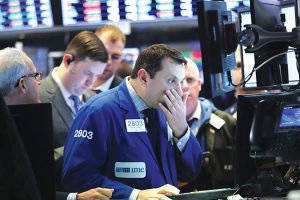BLOOMBERG
Treasury yields rose on concern a rally in oil prices will keep inflation elevated and put pressure on the Federal Reserve to go on raising interest rates.
The two-year US yield rose as much as 11 basis points to 2.73% as crude prices jumped after Opec+ announced a surprise oil production cut. This reignited concern about inflation and led traders to price in a higher terminal rate for the Fed. The Bloomberg Dollar Spot Index gained 0.4% before erasing the move.
Top oil analysts issued calls for $100 crude after the decision, in what would be a big reversal for markets. Oil fell to a 15-month low last month as tightening credit conditions following the banking crisis raised the prospect of an economic slowdown. WTI and Brent crude jumped as much as 8% on Monday to above $80 per barrel.
“High oil prices are a reminder that we’re not in the clear yet when it comes to inflation,†said Geoffrey Yu, a senior foreign-exchange strategist at Bank of New York Mellon, who said this will likely support the dollar and commodity-related currencies.
Money-market traders amped up their bets on the peak for US interest rates and swaps priced in about a 64% chance the Federal Reserve will raise rates again at its May policy meeting, according to data compiled by Bloomberg.
Higher US yields offered support for the dollar, which earlier advanced against most peers before the move was pared. Commerzbank says the greenback also benefits from the fact that the US economy is a net exporter of energy.
Opec’s move “will simply cause some of the expectations for a slowdown in inflation to be faded away,†said Hidehiro Joke, a senior bond strategist at Mizuho Securities in Tokyo. “Since inflation is likely to remain the biggest driver of the Fed’s monetary policy, the market will be less likely to assume an early shift to lower rates or a faster pace of rate cuts.â€
Meanwhile, stock trading for some Chinese developers was halted on Monday in Hong Kong for not releasing 2022 results, an ongoing reminder of the sector’s travails despite improving new-home sales.
CIFI Holdings Group and Jiayuan International were among 39 companies overall that were suspended for not disclosing figures to the Hong Kong stock exchange, according to Bloomberg calculations. CIFI said its auditor received an anonymous letter that raises challenges about some transactions while Jiayuan highlighted recent resignations among other factors.
Investment bank China Renaissance Holdings Ltd is also among the halted stocks, after the company said it will postpone releasing results because its auditors can’t get in touch with Chairman Bao Fan. He has been cooperating in an unspecified investigation by Chinese authorities.
Last year, at least 32 stocks were halted for firms not meeting the deadline to release annual results. Some of those developers — including defaulters Sunac China and Shimao Group Holding — have yet to resume trading as that year’s financial data remain undisclosed.
 The Gulf Time Newspaper One of the finest business newspapers in the UAE brought to you by our professional writers and editors.
The Gulf Time Newspaper One of the finest business newspapers in the UAE brought to you by our professional writers and editors.
